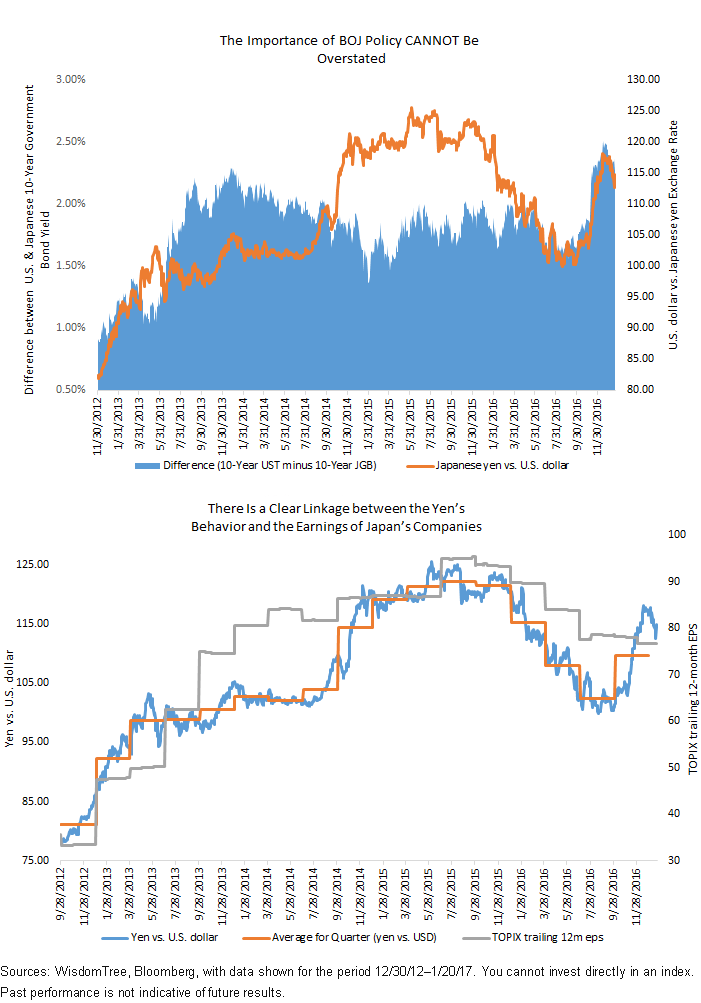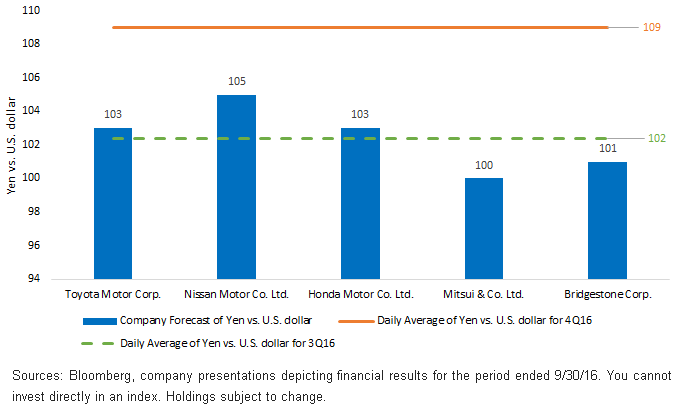Which Companies Planned for a Strong Yen in 2017?


In reviewing the most recent company presentations from some of Japan’s largest exporters, we noticed the following:1
- Toyota lost ¥565 billion in the first half of fiscal year 2017, due to a stronger yen.2
- Nissan lost ¥179.8 billion over the same period for the same reason.3
- Honda lost ¥943.9 billion in the first half of fiscal 2017, due to currency impacts.4
- Bridgestone’s operating income was down ¥49.2 billion over the first nine months of 2016 compared to the first nine months of 2015, and currency was a ¥48 billion negative headwind.5
- Denso, a manufacturer of electronic parts for automobiles, saw a negative ¥59 billion impact compared to the second quarter of Japan’s 2016 fiscal year, which ended September 30, 2015.6
Clearly, the yen matters—something that we’ve been saying for some time. A weaker yen creates the potential to unlock the valuations of Japan’s equity markets.
For Japan’s Equities Today, There Are Two Driving Dynamics

- On September 21, 2016, the yen had a closing value of ¥100.32 against the U.S. dollar7 as the Bank of Japan (BOJ) announced a policy that would target the yield of the 10-year Japanese government bond (JGB) at close to 0%. In its statement, the BOJ also mentioned a commitment to overshooting the 2% inflation target, showing a tendency to move slower rather than faster when it is time to remove monetary stimulus.8 In hindsight, this was the perfect setup for the surprise presidential election victory of Donald Trump and the reflation trade that followed. As the differential between the U.S. 10-Year Treasury yield and the Japanese government bond yield increased, the yen weakened almost in lockstep.
- A clear relationship exists between the level of the yen—particularly its average over a given quarter—and the subsequent earnings of Japan’s equity market. The two largest depreciations in the yen’s quarterly average against the U.S. dollar occurred during the initial publicity around Abenomics and Prime Minister Shinzo Abe’s election and then BOJ Governor Haruhiko Kuroda’s surprise October 31, 2014, move to expand the QQE program.9
- The highest earnings per share that we’ve seen in recent history on the Tokyo Stock Price Index (TOPIX) occurred during 2015—the same year in which we saw the yen touch ¥ 125–126 levels against the U.S. dollar—the weakest that we have seen during Abenomics.
- We haven’t yet seen any response within the earnings of TOPIX to the post-2016 U.S. presidential election yen weakness, but it is also notable that it is too early for many of the firms to have reported fourth-quarter results. A change in trend could be powerful here, if it is seen.
Companies Planned for a Stronger Yen Than Was Seen
As part of their corporate planning process, Japanese companies—especially the larger exporters—tend to predict where they think that the yen will be over the upcoming quarter. Most recently, this process occurred as companies closed the books on the third quarter of 2016.
The “Trump Election” Move Led to Significant Depreciation of the Yen in the Fourth Quarter of 2016

Above, we looked at the actual estimates provided in the most recent company presentations for the five largest companies within the Consumer Discretionary and Industrials sectors from within the WisdomTree Japan Hedged Equity Index. What we saw is that their estimates were very much in line with the average for the third quarter of 2016—and it makes sense that companies were prepared for the environment that they had just experienced. ¥109—the daily average level of the yen for the fourth quarter against the U.S. dollar—is a big move up. As of this writing, the yen was at approximately ¥113, indicating still further depreciation compared to the average for the fourth quarter of 2016.
Bottom Line: Can Earnings Momentum Increase?
The current expectations are for 10% earnings growth in 2017, based on assumptions of ¥105 to the U.S. dollar.10 If this level is ¥115, an incremental 8% to 10% could be added to these growth estimates, in our view.11 While we recognize that the market has moved upward, finding such strong earnings potential in global markets today is far from easy.
1For current holdings of WisdomTree Indexes and Funds, visit wisdomtree.com.
2Source: “FY2017 Second Quarter Financial Results,” Toyota Motor Corporation, 11/8/16.
3Source: “FY2016 First Half Financial Results,” Nissan Motor Co., Ltd., 11/7/16.
4Source: “FY17 2nd Quarter Financial Results,” Honda Motor Co., Ltd., 10/31/16.
5Source: “Financial Results for 3rd Quarter of Fiscal 2016,” Bridgestone Corporation, 11/9/16.
6Source: “FY 2017 2nd Quarter Financial Results ended Sep 30, 2016,” Denso Corporation, 10/28/16.
7Source: Bloomberg.
11Source: WisdomTree Japan.
Important Risks Related to this Article
Investments focused in Japan increase the impact of events and developments associated with the region, which can adversely affect performance.
Christopher Gannatti began at WisdomTree as a Research Analyst in December 2010, working directly with Jeremy Schwartz, CFA®, Director of Research. In January of 2014, he was promoted to Associate Director of Research where he was responsible to lead different groups of analysts and strategists within the broader Research team at WisdomTree. In February of 2018, Christopher was promoted to Head of Research, Europe, where he was based out of WisdomTree’s London office and was responsible for the full WisdomTree research effort within the European market, as well as supporting the UCITs platform globally. In November 2021, Christopher was promoted to Global Head of Research, now responsible for numerous communications on investment strategy globally, particularly in the thematic equity space. Christopher came to WisdomTree from Lord Abbett, where he worked for four and a half years as a Regional Consultant. He received his MBA in Quantitative Finance, Accounting, and Economics from NYU’s Stern School of Business in 2010, and he received his bachelor’s degree from Colgate University in Economics in 2006. Christopher is a holder of the Chartered Financial Analyst Designation.

